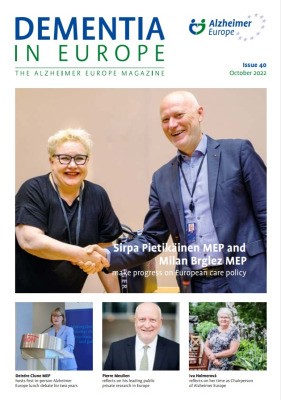Alzheimer Europe has published the 40th edition of its “Dementia in Europe” policy magazine, filled with interesting updates on European and national policy developments in the dementia field, as well as European research projects and other research news.
This edition has been published both electronically and in paper format, and its launch coincided with the first day of the 32nd Alzheimer Europe Conference, (#32AEC) taking place in Bucharest, from 15-17 October 2022.
The first section of the magazine includes an article on brain health. In recent decades, a lot of research has been dedicated to gaining a better understanding of brain health and about how to reduce the risk of dementia – in this section Alzheimer Europe examined two examples of EU-funded projects working in this area, EU-FINGERS and LETHE.
Francesca Mangialasche, Geriatrician and Assistant Professor in Clinical Geriatric Epidemiology at the Center for Alzheimer Research, Karolinska Institute, Stockholm, Sweden shared her thoughts and experiences and work done in relation to the two projects. In addition, two members of the EU-FINGERS Advisory Board Nick and Mercedes shared their thoughts.


